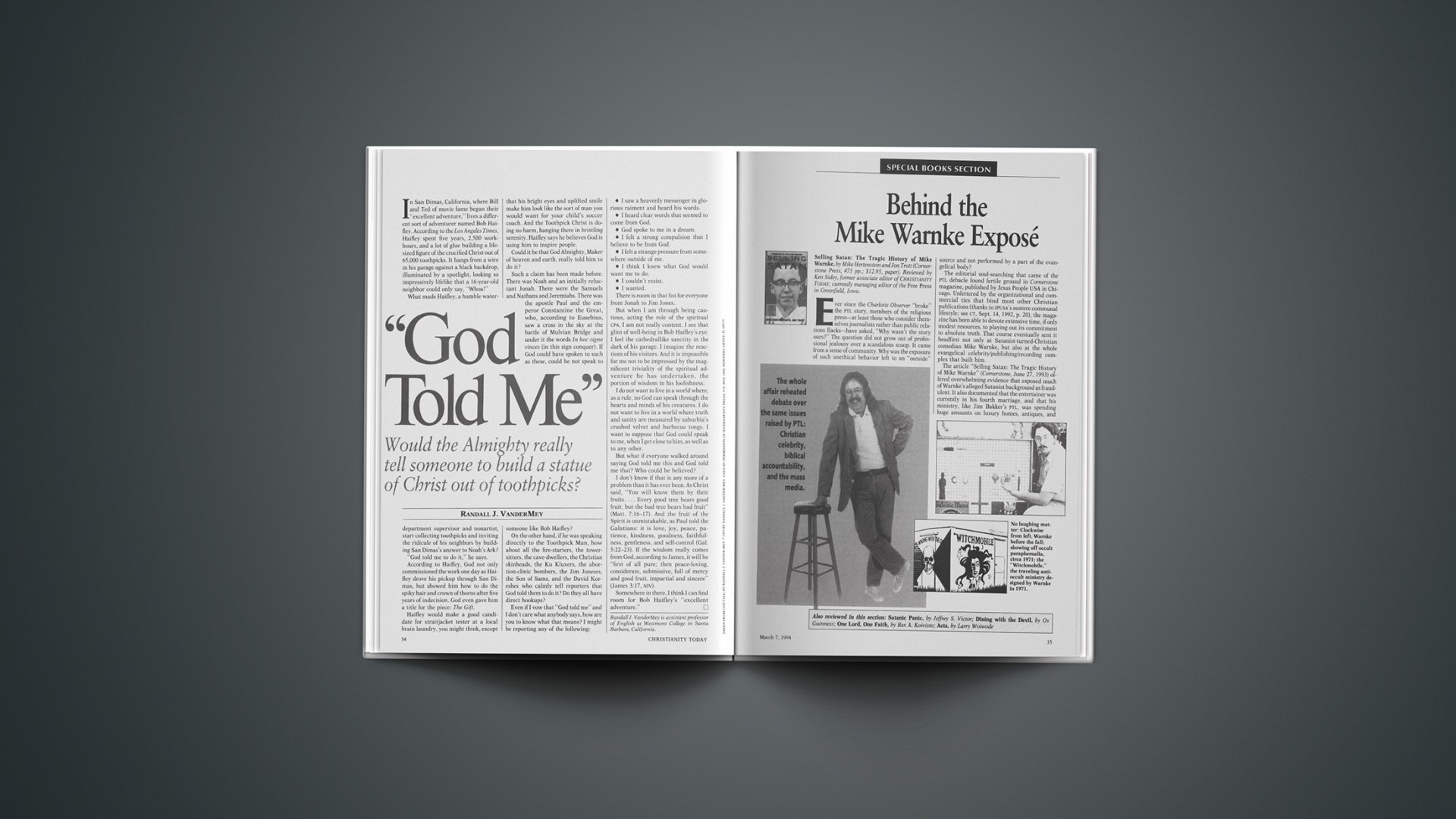Would the Almighty really tell someone to build a statue of Christ out of toothpicks?
In San Dimas, California, where Bill and Ted of movie fame began their “excellent adventure,” lives a different sort of adventurer named Bob Haifley. According to the Los Angeles Times, Haifley spent five years, 2,500 work-hours, and a lot of glue building a life-sized figure of the crucified Christ out of 65,000 toothpicks. It hangs from a wire in his garage against a black backdrop, illuminated by a spotlight, looking so impressively lifelike that a 16-year-old neighbor could only say, “Whoa!”
What made Haifley, a humble water-department supervisor and nonartist, start collecting toothpicks and inviting the ridicule of his neighbors by building San Dimas’s answer to Noah’s Ark?
“God told me to do it,” he says.
According to Haifley, God not only commissioned the work one day as Haifley drove his pickup through San Dimas, but showed him how to do the spiky hair and crown of thorns after five years of indecision. God even gave him a title for the piece: The Gift.
Haifley would make a good candidate for straitjacket tester at a local brain laundry, you might think, except that his bright eyes and uplifted smile make him look like the sort of man you would want for your child’s soccer coach. And the Toothpick Christ is doing no harm, hanging there in bristling serenity. Haifley says he believes God is using him to inspire people.
Could it be that God Almighty, Maker of heaven and earth, really told him to do it?
Such a claim has been made before. There was Noah and an initially reluctant Jonah. There were the Samuels and Nathans and Jeremiahs. There was the apostle Paul and the emperor Constantine the Great, who, according to Eusebius, saw a cross in the sky at the battle of Mulvian Bridge and under it the words In hoc signo vinces (in this sign conquer). If God could have spoken to such as these, could he not speak to someone like Bob Haifley?
On the other hand, if he was speaking directly to the Toothpick Man, how about all the fire-starters, the tower-sitters, the cave-dwellers, the Christian skinheads, the Ku Kluxers, the abortion-clinic bombers, the Jim Joneses, the Son of Sams, and the David Koreshes who calmly tell reporters that God told them to do it? Do they all have direct hookups?
Even if I vow that “God told me” and I don’t care what anybody says, how are you to know what that means? I might be reporting any of the following:
• I saw a heavenly messenger in glorious raiment and heard his words.
• I heard clear words that seemed to come from God.
• God spoke to me in a dream.
• I felt a strong compulsion that I believe to be from God.
• I felt a strange pressure from somewhere outside of me.
• I think I knew what God would want me to do.
• I couldn’t resist.
• I wanted.
There is room in that list for everyone from Jonah to Jim Jones.
But when I am through being cautious, acting the role of the spiritual CPA, I am not really content. I see that glint of well-being in Bob Haifley’s eye. I feel the cathedrallike sanctity in the dark of his garage. I imagine the reactions of his visitors. And it is impossible for me not to be impressed by the magnificent triviality of the spiritual adventure he has undertaken, the portion of wisdom in his foolishness.
I do not want to live in a world where, as a rule, no God can speak through the hearts and minds of his creatures. I do not want to live in a world where truth and sanity are measured by suburbia’s crushed velvet and barbecue tongs. I want to suppose that God could speak to me, when I get close to him, as well as to any other.
But what if everyone walked around saying God told me this and God told me that? Who could be believed?
I don’t know if that is any more of a problem than it has ever been. As Christ said, “You will know them by their fruits.… Every good tree bears good fruit, but the bad tree bears bad fruit” (Matt. 7:16–17). And the fruit of the Spirit is unmistakable, as Paul told the Galatians: it is love, joy, peace, patience, kindness, goodness, faithfulness, gentleness, and self-control (Gal. 5:22–23). If the wisdom really comes from God, according to James, it will be “first of all pure; then peace-loving, considerate, submissive, full of mercy and good fruit, impartial and sincere” (James 3:17, NIV).
Somewhere in there, I think I can find room for Bob Haifley’s “excellent adventure.”
Paul Brand is a world-renowned hand surgeon and leprosy specialist. Now in semiretirement, he serves as clinical professor emeritus, Department of Orthopedics, at the University of Washington and consults for the World Health Organization. His years of pioneering work among leprosy patients earned him many awards and honors.










